At 3:40 p.m. local time Wednesday in Flowery Branch, Ga., an hour North of Buckhead, Kirk Cousins’s agent, Mike McCartney, was dropped off in front of the Atlanta Falcons’ facility. Twenty minutes later, the quarterback himself pulled in, timing his entrance for 4:01, and carrying a garment bag with a silver suit, white dress shirt, and shiny, solid red tie inside it.
Falcons coach Raheem Morris, flashing his trademark, 10,000-watt smile, was waiting, as was GM Terry Fontenot, and much of the Atlanta staff, to welcome their new franchise quarterback.
An hour later, after introducing him to folks around the building, Cousins was reunited with his wife, Julie, who arrived at Falcons headquarters on her own, from her parents’ place in Alpharetta, Ga. She had the couple’s sons, Cooper and Turner, with her in a conference room near Morris’s office—and, as little kids tend to do, they were busy generating general chaos.

Matt Krohn/USA TODAY Sports
Approaching the scene, McCartney smiled and assured Morris, “It’s not like this every day.”
“Mike,” Morris shot back, “Yes, it is, because I’m here. I’m the same way as these kids.”
It was a joke, of course. Viscerally, though, two points were illustrated.
One, the excitement in the Falcons’ building over landing their quarterback, just two months after Morris and his staff arrived, was palpable. And, two, the fit for Cousins and his family, at least as first days go, was promising to be every bit as good as he’d hoped it would be two days earlier, when he gave McCartney the go-ahead to push a four-year, $180 million contract with the Falcons over the goal line.
But just as it was a beginning for Cousins, it was also an ending to his six-year run in Minnesota, and a protracted, two-year negotiation with the Vikings. This was, for the quarterback and those around him, different than the last time, when he became a Viking after things disintegrated in the years leading up to his 2018 departure from Washington. He loved Minnesota. He was close with Kevin O’Connell. He had a really good situation football-wise, too.
There was no personal animus in his decision to leave. Simply, it was business.
And as much as Cousins’s arrival in Atlanta felt great—the same way landing in Minneapolis did six years ago—the good feelings Cousins had for the Vikings made it a tad bittersweet.
That said, he was ready for the next step, another chapter with years, plural, left in it.
In the end, that the Falcons were willing to go there with Cousins was his personal deciding factor.
So he’s ready to leave the past behind, and lead them. And we have the story of how he got to that point.
With a week of NFL free agency in the books, we have a ton to dig through. So over in the takeaways, you’ll find …
• A full appreciation for Aaron Donald’s career from his two head coaches.
• Why the Pittsburgh Steelers’ quarterback upheaval will put Mike Tomlin on the spot.
• How the Chicago Bears’ return for Justin Fields fell through.
And a whole lot more. But we’re starting with the inside story of Kirk Cousins’s departure from Minnesota, and his arrival in Atlanta.
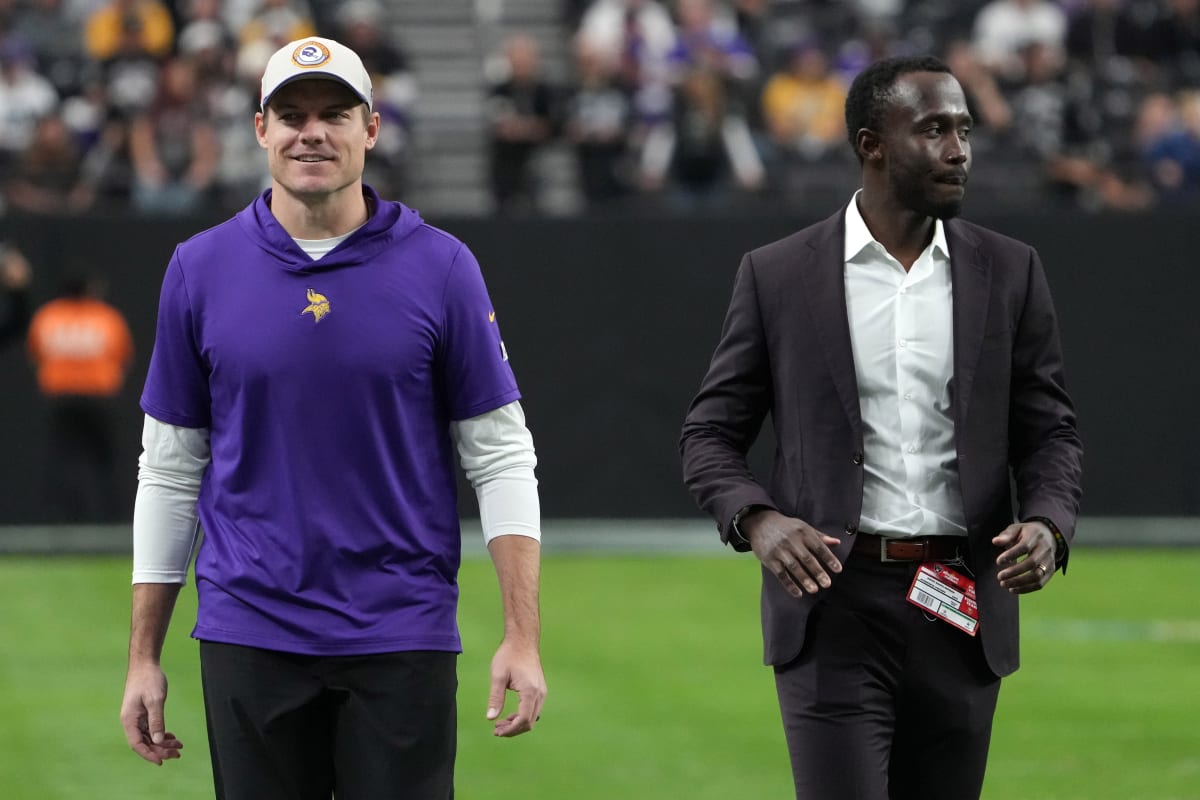
Kirby Lee/USA TODAY Sports
It was on the third floor of the JW Marriott in downtown Indianapolis, 25 months ago, that the first Cousins-related meeting between the Vikings’ new regime and the quarterback’s camp took place. O’Connell and McCartney picked a high-top table, out in the open, and in front of everyone, to talk shop.
A Band-Aid, one-year, $35 million extension was coming, but the coach and agent weren’t there to talk about that. Instead, O’Connell laid out his plan for maximizing Cousins, who he had coached in Washington under Jay Gruden in 2017. The quarterback was still playing well, but in cycling through offensive coordinators under Mike Zimmer, O’Connell thought stability could bring out another level in Cousins’ game.
The overarching idea was simple: make Cousins the best version of himself. And in 2022, Cousins threw for 4,547 yards and 29 touchdowns in his first season back with O’Connell, posting the best win-loss record of his career by a wide margin at 13–4.
That led to O’Connell and McCartney meeting again, in that same hotel, a year later, with Cousins again headed for a contract year. This time, the coach and agent were joined by Vikings GM Kwesi Adofo-Mensah and EVP of football operations Rob Brzezinski in an open room that they’d found to negotiate in.
McCartney carried Cousins’s history into the meeting with him. He and Cousins had hatched a plan in Washington to weaponize fully guaranteed franchise tags. Absent a suitable, market offer from the team that drafted him, Cousins would play on consecutive tags, betting that Washington wouldn’t tag him a third time in 2018 at 144% of his ’17 number. Cousins and McCartney won the bet, which is where the Vikings came into the picture.
With a team coming off an NFC title game appearance, the Vikings won the bidding war by giving Cousins, contractually, what he wanted—a fully guaranteed deal that would effectively assure that he was the guy for the team. He signed a three-year, $84 million contract, affording him the leverage to negotiate fully guaranteed extensions: two years, $66 million for 2020 to ’21, and one-year, $35 million for ’23.
Add it up, and Cousins played eight consecutive seasons on fully guaranteed contracts.
At the 2023 combine, McCartney wasn’t pressing for a fully guaranteed deal, but he was transparent with the Vikings contingent that structure and guarantees would be even more important to Cousins than just raw total money. So where often a team will increase overall money in an offer to get a player to back off guarantees—and essentially build itself a contractual escape hatch—Minnesota had a player who was willing to take less to close those escape hatches.
The conversation was cordial, but the signs of a philosophical divide were there.
The Vikings didn’t want to offer much in the way of guarantees past 2024, and hinted that, in the couple of years to follow, the search for Cousins’s successor would be on. So putting the pieces together, the concern for Cousins’s camp was the very real sense that the Vikings would draft a quarterback, maybe in the first round in ’24, which would almost certainly lead to Cousins’s exodus in ’25, with the potential that the starting job could go away before that.
So knowing Cousins would be the team’s starter in 2023, McCartney saw the proposal as assuring the quarterback one extra year, and nothing beyond that, which wouldn’t be nearly enough for him to pass on the potential of hitting the market in March of ’24. The sides knew there was a healthy difference in outlook, so they resolved to keep talking, and McCartney and Brzezinski did.
At the end of the first wave of free agency, in mid-March of 2023, after McCartney sent one last counteroffer, Brzezinski said the team would pull back and let things play out a little. McCartney agreed, “Hey, let’s just get through the draft.”
For all intents and purposes, negotiations were tabled for 2023.
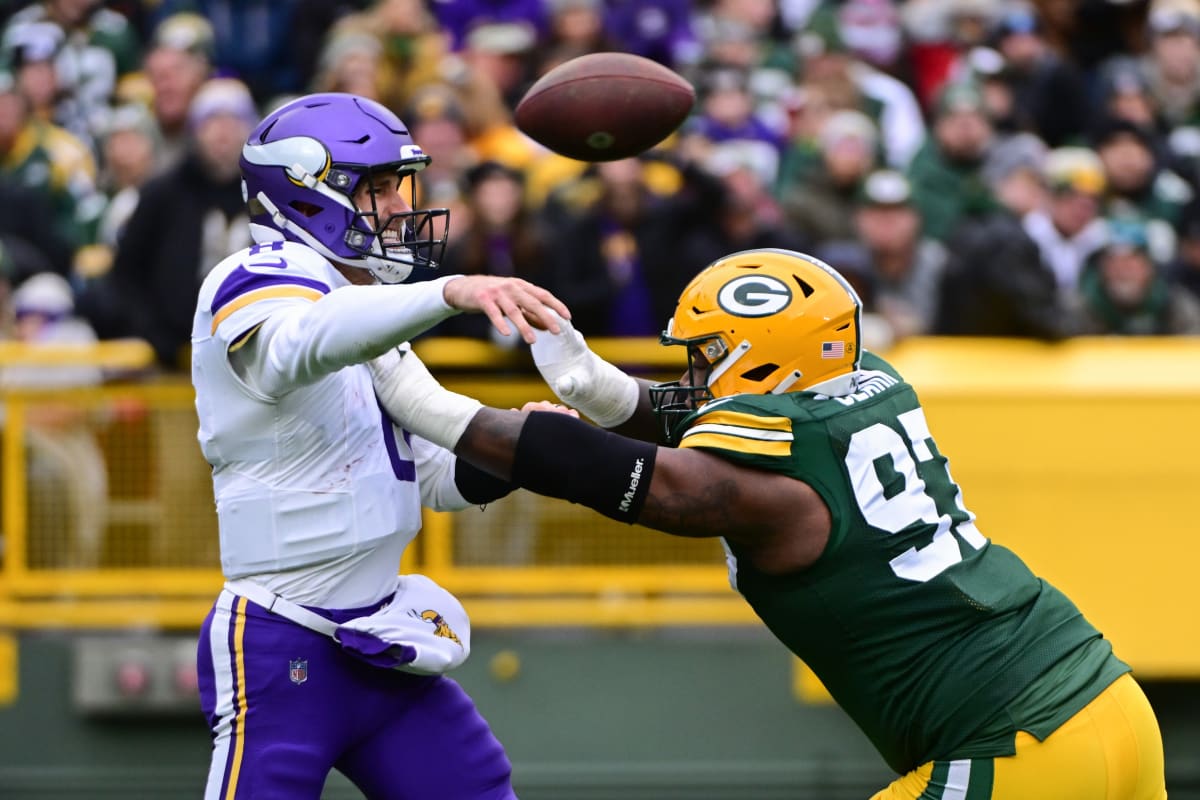
Benny Sieu/USA TODAY Sports
McCartney watches games on Sundays in the basement of his suburban Chicago home. He has a 70" TV with 55" TVs on each side of it. This year, given the circumstances, the Vikings had a permanent spot on the big screen, and it was on that screen that the agent watched as Cousins dropped back, planted his foot awkwardly in the Lambeau Field grass and quickly crumbled to the ground.
It was Oct. 29, and Chris Hutchinson, a Detroit-area emergency room doctor and the father of McCartney client Aidan Hutchinson, texted the agent almost immediately.
“I think it’s his Achilles,” Hutchinson wrote.
He was right. Cousins’s season was over. McCartney scrambled to call Cousins’s father, Don, and assure him that, given his experience with clients’ Achilles ruptures, he had a list of specialists that’d give Kirk the best chance at a speedy recovery.
Cousins texted McCartney with confirmation that it was a torn Achilles shortly thereafter, and by the time he called back, McCartney had a choice of four surgeons lined up: Neal ElAttrache in Los Angeles, Robert Anderson in Green Bay, David Porter in Indianapolis, and Vikings team doctor Chris Coetzee. The two jumped on a call with Cousins’s personal trainer, Chad Cook, to map out a Minneapolis-based rehab plan.
The next day, from the Admirals Club lounge at Chicago O’Hare Airport—with McCartney booked to fly to Detroit for that evening’s Lions–Raiders Monday nighter—the group reconvened over conference calls to talk with doctors and set up surgery. Hours later, Cousins called McCartney—who was now on the turf during pregame at Ford Field—to tell him he was leaning toward Coetzee. On Tuesday, McCartney was navigating another of his clients, Joshua Dobbs, being traded to the Vikings to take Cousins’s spot on the depth chart. On Wednesday, Coetzee operated on Cousins.
Two weeks later, on Nov. 16, McCartney had an Excel spreadsheet ready, with the quarterbacking landscape for 2024 sketched out. He had the Las Vegas Raiders, New England Patriots, New York Jets and Tampa Bay Buccaneers listed in the “strong needs” category at the position. He had Atlanta, Chicago, the Arizona Cardinals, Denver Broncos, Green Bay Packers, Minnesota and the Los Angeles Rams listed as “concerning,” and the New Orleans Saints, New York Giants, Seattle Seahawks and Washington Commanders as “teams to watch.”
In early December, he’d moved the Vikings into the “strong needs” category. Later that month, the Falcons were also in that category. And by the time January rolled around, the revised research McCartney had done showed Atlanta, Denver, Vegas, Minnesota, New England, Tampa, Washington and the Jets as the eight in the “strong need” category, with the Buccaneers and Vikings in with quarterbacks as free agents, and the Jets at the off chance that Aaron Rodgers would wind up retiring.
Meanwhile, as the coaching carousel spun, fortune shined on the Falcons. Morris spent three years with Cousins in Washington as a defensive backs coach and (as coaches from the Shanahan tree do) cross-trained some on the other side of the ball, putting him in the quarterbacks room with Cousins regularly, where the two built a bond. Then, there was Morris’s new OC, Zac Robinson, who’d worked under O’Connell with the Los Angeles Rams, and actually faced Tom McCartney, Mike’s brother and a Colorado high school coach, as a prep quarterback near Denver.
As it turned out, it wasn’t long before the Falcons were doing some research of their own.
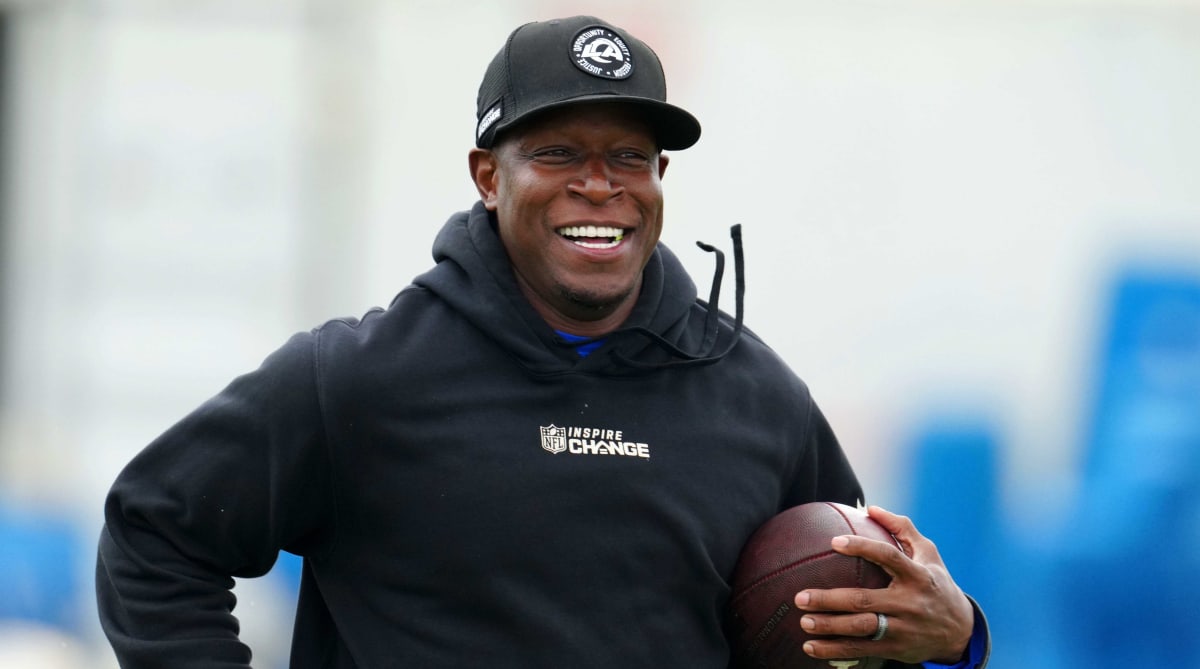
Kirby Lee/USA TODAY Sports
Morris, a defensive coach by trade, was purposeful in stacking his first Atlanta staff with quarterback-adjacent coaches. The hire of Robinson was just the start. Quarterbacks coach T.J. Yates played seven seasons as an NFL quarterback. Assistant quarterbacks coach D.J. Williams (Doug Williams’s son) and offensive assistant K.J. Black were quarterbacks, too, with experience coaching the position. And senior offensive assistant Ken Zampese has coached quarterbacks in the NFL for decades.
So once the dust settled, Morris and Fontenot directed all those coaches, plus assistant GM Kyle Smith and director of player personnel Ryan Pace, to aggressively grind through both the college and pro quarterbacks. They wanted to come up with a coherent plan to, once and for all, plug the hole that their predecessor, Arthur Smith, hadn’t over the previous three years.
To run the offense they’d collectively envisioned—behind Robinson’s leadership—they needed a quarterback who could be an effective distributor, throw with accuracy and anticipation, and be a multiplier for the young skill-position guys already assembled.
So the ideal fit was a quarterback like Drew Brees, who Fontenot and Pace had grown up with as young Saints personnel men. Interestingly enough, those in the Shanahan tree who were with Cousins in Washington, long felt Cousins, under the right circumstances, could be a quarterback who’d mirror Brees in a lot of ways.
So at the end of the deep dive, the Falcons had Cousins as their top veteran target, Tampa’s Baker Mayfield after him, and a comfort level with the top quarterbacks in the draft as well, which brought Atlanta to the 2024 combine in position to investigate a trade up.
While the likelihood was Cousins would remain the top target, the Falcons resolved to look into moving within the top five. Inquiries with the Bears, Commanders and Patriots at the combine didn’t go very far—none of the three were willing to move, at least not at that early juncture. And waiting for that to change would mean missing the market for veterans, a risk the Falcons were never going to take.
To prepare for the game of musical chairs, though, the possibility of having a rookie helped to inform alternate plans. One would include an expensive quarterback such as Cousins or Mayfield. The other would have a more economical player at the position, be it a rookie or a vet such as Justin Fields, and more spending on defense, with the potential pursuit of stars such as Danielle Hunter and Christian Wilkins.
Meanwhile, the Vikings were still looking to see if they could take Cousins off the table for the Falcons, and everyone else.
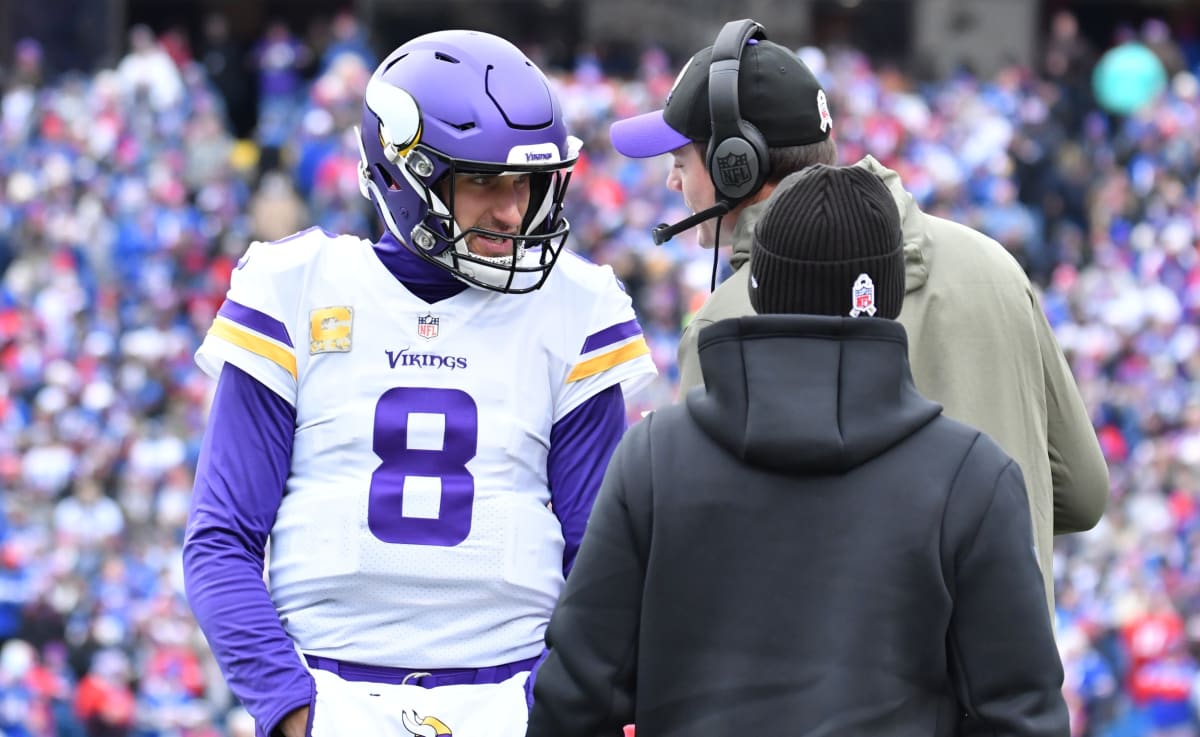
Mark Konezny/USA TODAY Sports
Two years removed from McCartney and O’Connell being able to meet unbothered in that open area of the JW Marriott, the Vikings rented a conference room to get those two, Adofo-Mensah and Brzezinski away from the hysteria that seemed to be enveloping their unstable quarterback situation at the 2024 combine.
Everyone was looking for information.
Would it be $25 million per year? $35 million? Were the Falcons taking the lead?
Very few knew outside of the four in that room.
And as the negotiations resumed, the first purpose, clearly, was for Minnesota to show it genuinely wanted Cousins back—a sentiment the agent felt strongly from O’Connell, who’d been in touch with his team captain since the season ended. McCartney didn’t doubt the Vikings’ intentions on that. Conversely, he couldn’t shake his feeling that the team was going to draft a quarterback two months later, and that Cousins was being offered a bridge contract that would guide the Vikings through the transition.
Minnesota was coming up in its proposal. The overall money was really good, and, after only nominal guarantees had been built into 2025 in previous offers, the Vikings offered to guarantee more cash.
Still, the numbers allowed for Minnesota, given how offsets work, to bail out of the deal after a single year without much monetary damage—if it drafted a quarterback in April and wanted to fully hand him the keys after the 2024 season. And that was why the structure of guarantees took precedence over total cash for Cousins—because it tells the quarterback how long a team will be committed to him as starter before it gains the flexibility to pass the torch.
After about 40 minutes in the room, and trading potential creative fixes, the differences remained in how guarantees would be structured. McCartney said to Brzezinski, “Rob, listen, I owe it to Kirk to go to the market.” Brzezinski agreed.
At that point, the Vikings had given Cousins an offer that, if the market wasn’t as strong as it had been six years prior, he might wind up taking. But Minnesota also had to prepare for the possibility that the market would be strong—just like Atlanta, the Vikings were working on alternate plans.
Minnesota viewed Mayfield as a viable second option, too, but, at the same time, doubted he would leave Tampa Bay. After that, there was the idea that the Vikings could sign an affordable vet with upside, and pursue quarterbacks in the draft. Minnesota, by then, had become intrigued with San Francisco 49ers backup Sam Darnold, the 26-year-old who’d washed out after going third to the Jets in the 2018 draft.
As O’Connell and Adofo-Mensah studied Darnold’s 2022 tape, they saw a guy who went 4–2 at the end of a lost season with a Carolina Panthers team that wasn’t much different than this year’s 2–15 version. The traits that made him a top pick were there, and he flashed an element of “overcoming” with the plays he was creating off-schedule. The year-over-year growth was there, too, in how he’d cleaned up his feet and was playing faster with the offense in the little time he had as a 49er (and in the end of a blowout loss to the Ravens, in particular).
So Darnold would be a target, and the team would start looking at positioning itself to have the flexibility to move up for a quarterback, too—which would have to start with acquiring extra capital. Meanwhile, like the Falcons had, there was a second element of the plan to use some of the money saved (in not spending on the quarterback) on defense.
But all these things were still hypotheticals as McCartney and Vikings people left that conference room in Indy.
They resolved to talk daily from there on out.
Adofo-Mensah told McCartney early in the negotiation that he wanted to be solution-oriented in his approach. And going into the final week before free agency opened, the Vikings and Cousins hadn’t given up on finding one.
On March 6, the Wednesday before free agency, Brzezinski had a final, longer phone call with McCartney. Both sides had pushed and moved their limits to try and find common ground but just couldn’t seem to get there. The Vikings’ three-year offer allowed too much wiggle room in 2025 for McCartney’s liking. That was when the time had come for the two to start mapping out the following week.
One key agreement was that, for everyone involved, a fast, efficient decision would be best, allowing for Cousins to move on, and for the Vikings, Falcons and anyone else involved to enact their Plan B before the market at quarterback and other positions passed them by. McCartney’s experience as a personnel director in Philadelphia two decades ago gave him perspective and empathy for the others’ situation, making that as much a priority for him as it was for the teams.
O’Connell and Cousins had an hour-long conversation on March 7 so both could have some clarity on where things stood. The coach and quarterback had a good bond in Washington in 2017, and that bond had become exponentially stronger over their two years together in Minnesota. Their wives and kids knew each other, so the looming split would go beyond football. The two talked again on March 10, the day before the legal tampering period would begin.
Later that evening, Cousins and McCartney huddled, with McCartney asking for Cousins’s permission to move on an offer if it had a second year fully guaranteed and guarantees into a third year. Atlanta, at that point, seemed like the most obvious suitor and, as luck would have it, the most natural landing spot for the quarterback’s family. Julie grew up in suburban Alpharetta, went to the University of Georgia, and she, Kirk and the kids had even planned a family road trip for that week to go see her folks in Atlanta.
Cousins, not lacking the financial wherewithal to fly his family (private, if need be), loves road tripping. He told McCartney he’d get to Alpharetta, leave Julie and the kids with her family, and be ready to go anywhere—be it just down the interstate or through Hartsfield back to Minnesota—for a press conference on Wednesday. And that, yes, the agent could move forward if the right offer came along.
By Monday, the Cousins’s family journey was well underway; the Falcons and Vikings GMs and coaches were at their respective team headquarters; and McCartney was back in his home office.
Fontenot’s first call just after noon local time on Monday (11:01 a.m. where McCartney and the Vikings were) was to Cousins’s agent, and it was direct and straightforward. They’d be willing to guarantee the first two years of a contract, and get well into the $40-million-plus range on average per year. They were open to talking about a third-year guarantee. They wanted Cousins and were ready to show it.
The conversation lasted 20 minutes, and McCartney knew he was in good shape.
Meanwhile, the Falcons’ GM then had to set up failsafes. Mayfield had agreed to terms with the Buccaneers the day before, and that meant, for both Atlanta and Minnesota, their respective plans would change significantly if Cousins wasn’t coming. So Fontenot took a call from David Mulugheta, the agent for Wilkins, and a text from Zeke Sandhu, the agent for Hunter, both of whom told him they expected the bidding on their free agents to get to, and probably past, $25 million per year.
McCartney called Cousins to give him the update, then his partner at VaynerSports, Kyle Dolan, to connect him with Falcons negotiator Chris Olsen, so those two could touch base on some more finite details. The Broncos and GM George Paton had also touched base with McCartney, letting him know that, while the team was a little hamstrung cap-wise, he and Sean Payton liked Cousins a lot, and would be interested if the market changed a bit.
Then, the agent called the Vikings.
McCartney said to O’Connell, Brzezinski and Adofo-Mensah, “It’s not over, but I’m getting hopeful.” Brzezinski asked McCartney if he got guarantees into a third year. McCartney responded that he didn’t, and that’s why it wasn’t over yet, but he was fighting for it, and thought he was going to get to $45 million per year.
At that point, Minnesota had a pretty good idea that the ship was sailing, and the change in tone of the conversation was a good indication of it, so McCartney dove in with the Falcons.
The agent landed a $10 million guarantee for 2026, the third year of the deal. It wouldn’t, of course, assure that Cousins was on the team that fall, but it would make it even harder for the Falcons to exit the deal after ’24. And it would give Cousins the assurance that he’d be Atlanta’s starting quarterback in ’25.
Meanwhile, Dolan and Olsen worked through terms, including a $2 million incentive for a Super Bowl title built into each year, with Atlanta willing to drop the threshold that Cousins had to be MVP to get it (which he had in Minnesota). A no-trade clause was built in, along with the timing of Year 3 and Year 4 roster bonuses, and the payout of the signing bonus was negotiated, too.
As negotiations continued, McCartney called Cousins, who was driving with his family somewhere in Tennessee.
“Hey, we’re done with Atlanta,” the agent told Cousins. “We feel great about it.”
McCartney then took Cousins through the key points of the agreement, and Cousins then said, “O.K., so when are you going to release this?” McCartney told him he planned to reach out to Brzezinski, and then post the news to X, the former Twitter. “Your phone’s about to blow up, buddy,” McCartney said, with a laugh.
The agent touched base with both Brzezinski and Adofo-Mensah. At 2:24 p.m. ET, Cousins texted O’Connell to let him know it was done, and he’d be a Falcon.
At 2:36 p.m. ET, 1:36 p.m. in his home office in Illinois, McCartney hit send: “Excited for @KirkCousins8 agreeing to a 4 year deal with the @AtlantaFalcons.”
Within five minutes, McCartney had some 80 texts, including some from friends in the business and others from reporters hungry for details.
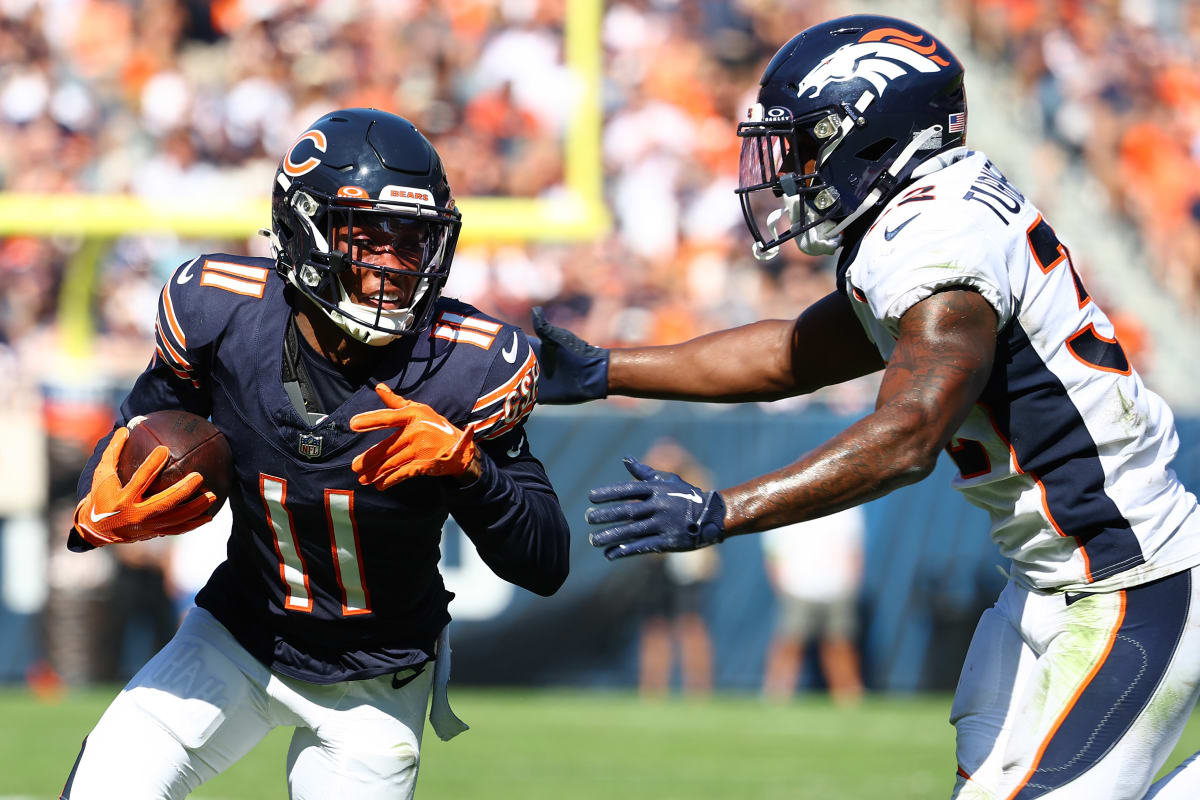
Mike Dinovo/USA TODAY Sports
There wasn’t much time for anyone to sulk or celebrate less than three hours into free agency.
The Falcons pivoted off Hunter and Wilkins, and over to more economical options to add speed to their young core of skill-position players—choosing receivers Darnell Mooney as a free agent and Rondale Moore by trade, to add to former top-10 picks Kyle Pitts, Drake London and Bijan Robinson. The Vikings, meanwhile were purposeful in stocking the defense with rising young talent, adding Jonathan Greenard, Andrew Van Ginkel and Blake Cashman while letting Hunter go, and swooping in to add Aaron Jones after Green Bay cut the tailback.
Minnesota also moved forward at quarterback, first on a one-year, $10 million deal with Darnold, then on a trade with the Houston Texans (talks on it started before free agency) that’d give the Vikings a second first-round pick, arming them for a potential trade up. They also had plans in motion for quarterbacks coaches Josh McCown and Grant Udinski to be in Ann Arbor for Michigan QB J.J. McCarthy’s pro day this Friday. Minnesota also arranged a private workout on campus with McCarthy for next week, with O’Connell and Adofo-Mensah set to make that trip.
And as for McCartney, he did give himself a tick to enjoy it before diving back into work.
Because of the trust he and Cousins had, the two didn’t even have to talk much throughout the negotiation. After all they’d been through—from the unique approach they’d jointly taken nearly a decade earlier to his Vikings contracts—Cousins knew he and McCartney were on the same page, and their vision was shared. On the other end of the partnership, having a client with the stomach to do what Cousins has was never lost on McCartney.
“He is extremely comfortable in his own skin,” McCartney said during the week. “He’s a very confident guy. When I laid out the vision all those years ago, he was quickly in favor of it. It’s not easy to completely bet on yourself, but he’s willing to bet on himself. He’s got a strong faith—extremely strong faith. Dad’s a pastor, and I know he prayed a lot about it. He was comfortable enough to bet on himself. So it’s his faith, his confidence, his willingness to bet on himself …”
Then, now with time to reflect, McCartney recalled recruiting Cousins out of Michigan State in 2011. Through that football season, he’d only talked to Cousins’s father, who then asked McCartney to meet him at the Hudsonville Ice Cream creamery in the quarterback’s hometown of Holland, Mich., a two-hour drive from Chicago. As McCartney met with Don and his wife, Maryann, the owner of Hudsonville came over and said he wanted to give the agent some ice cream to take home to his kids.
McCartney didn’t quite understand what he was accepting at the time. Before he knew it, workers were loading a dozen cartons on dry ice into his back seat. The agent will never forget it, because his kids were never so happy to see him come home from a work trip.
He’d also remember it, because at that point he hadn’t even met the quarterback yet, and, in time, he’d come to learn the story was so perfectly, and authentically, Cousins. The same way it was very Cousins to be on a cross country roadtrip with his family when he found out he’d landed $100 million guaranteed with a new team, or to have kids going crazy around that conference table as his new head coach entered the room Wednesday.
The fit, Morris and Cousins knew pretty quickly, was the right one. And they can only hope the rest of their new story plays out as perfectly as the start did.







